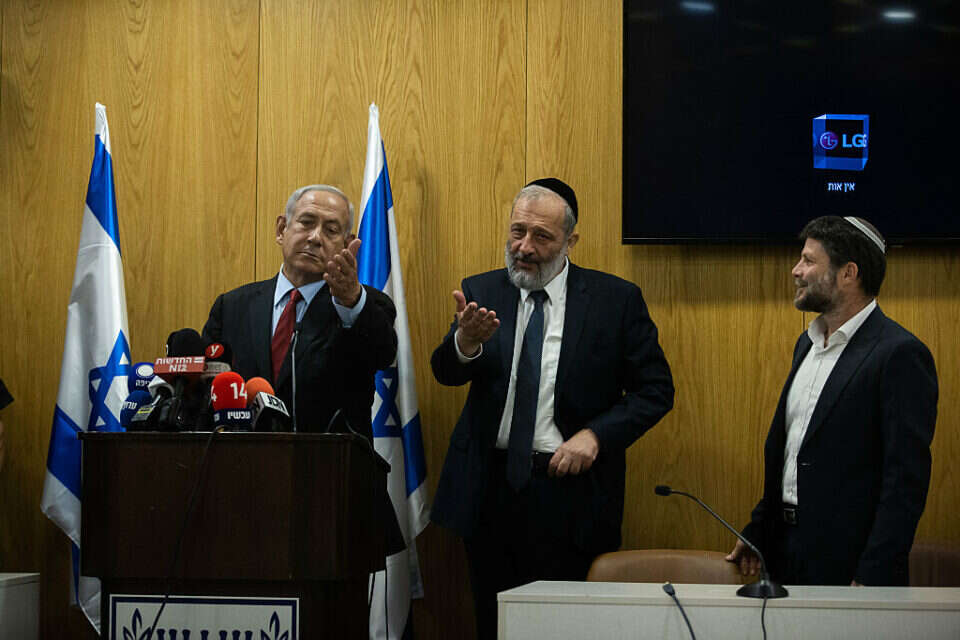The coalition forming before our eyes, for all its 64 members of the Knesset, is considered the most homogeneous that has been here in recent years.
But still, the ongoing negotiations between the partnership reveal cracks that may open later.
If in matters of settlement in the Yash, Smotrich is the only one who flanks the Likud on the right; and if in the legal issue, with the exception of Netanyahu, all the members of the Likud, the ultra-Orthodox and the religious Zionists advocate far-reaching changes to the legal system - then there is an issue that appears to be the government's main fault line: Jewish identity .
For the first time, the government is divided into two main blocs: an ultra-religious bloc, which consists of Shas, Torah Judaism, religious Zionism, Noam, and Otzma Yehudit - as opposed to the Likud bloc. ", said Aryeh Deri this week and used this division.
MK Avi Maoz. Netanyahu already had to put out the fire, photo: Naama Stern, Oren Ben Hakon
In fact, on the issue of the state's Jewish identity - with an emphasis on legislative initiatives and religious issues - there is now a strong bloc flanking the Likud on the right, which for the first time remains the only representative in the government that represents a secular and liberal voice.
Smotrich supports most of the positions of the ultra-Orthodox.
Regarding the Noam party, there is nothing to explain, and Ben Gvir also has many religious conservatives - the three future ministers of the party will wear a kippah, and one of them is a rabbi.
Those who disagree with this column will argue that the Netanyahu block is not just called the "faith bloc" - it represents a strengthening of Jewish identity, and therefore was also elected on the ballot.
This statement is partly true.
Among the Likud voters and its representatives in the Knesset there is a secular majority.
There is no doubt that most of them prefer the strengthening of Jewish identity compared to the liberal view of the center-left bloc.
However, it can be seen that the ultra-orthodox and religious parties support the promotion of a Jewish identity with a halakhic tone, while Likud advocates the adoption of a traditional approach to Judaism.
Galant and Barkat.
are considered to have a more secular-liberal outlook, photo: Koko
Gender segregation in public events and services for religious people, a flexible conscription law without conscription goals, banning public transportation on Shabbat even in secular cities and entertainment centers, strengthening the powers of the rabbinic courts, changing the status quo on the Temple Mount, canceling the grandson clause in the Law of Return, canceling pride parades, issuing zealous programs "B from the Ministry of Education and budgeting billions for ultra-Orthodox yeshiva and institutions - these are some of the programs that the partnership sought to anchor in the coalition agreements, while Likud does not feel comfortable with them and would be happy to give them up, or limit them.
The ruling party can also be divided on the issue.
Dodi Amsalem and Shlomo Karai, who miraculously preserve the Jewish identity, are not like Netanyahu, Galant, Barkat and others, who are considered to have a more secular-liberal outlook.
"There are real gaps between us and religious Zionism or Jewish power," Galit Distal said last night in an interview with Gali Israel.
"We are a liberal right. A right that very much subjects itself to reality, and does not make messianic, childish and absolute statements that have no possibility in reality. Parties from the right to the right think that running the country is seeing through the keyhole. On the other hand, there is Netanyahu's RealPolitic."
Just a few hours earlier, Netanyahu was already forced to put out a fire and issue a clarification following the words of Avi Maoz, who promised to cancel the Pride Parade in Jerusalem.
As mentioned, it seems that the chairman of the Likud will have to deal a lot with the balance between his political realism and the religious demands of the partnership bloc throughout the coming term.
were we wrong
We will fix it!
If you found an error in the article, we would appreciate it if you shared it with us

